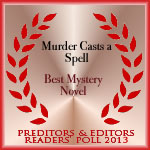Most authors agree that writing is rewriting is revising. The question is how to do it? After many long hours of editing my work, I’ve developed a few strategies that seem pretty effective. Here are 7 of them.
1. After completing your novel, put your manuscript out of your sight and out of your mind for at least a couple of weeks. This will allow you to detach enough from your masterpiece to enable a needed measure of objectivity.
2. Examine the opening of the story. Make certain it starts with something happening that will impact the viewpoint character and set her on a path toward a goal. Delete any poetic descriptions of clouds.
3. Check your chapter endings. Most of them should end with something that hooks the reader—a twist, disaster, crisis or a character in serious jeopardy (physical, emotional, mental).
4. Look carefully at your viewpoint character. Check to see that most of the story takes place in that character’s viewpoint. Revise scenes in which you jumped in and out of several different character viewpoints. Take out unnecessary self-indulgent author intrusions.
5. Consider the story ending. Does the ending solve the character’s problem or show that she met her goal? Does it answer the question posed at the beginning of the story? If not, revise.
6. Be sure your timing is correct. Don’t place your character in Paris at three pm and in San Francisco an hour later. A timeline chart really helps.
7. Find every “coincidence” in your novel and replace it with struggle for your character.
Of course, line edit your novel. Eliminate all spelling and grammar errors. Often your best work results from writing, rewriting and revising.
More tips:
Polish Your Writing: Cut the Riffraff












Reblogged this on Life as a Writer and Artist.
LikeLike
By: deepercolors on May 31, 2012
at 7:30 pm
Thank you for your support.
LikeLike
By: Nancy Curteman on June 2, 2012
at 9:29 am
Thank you for the reblog.
LikeLike
By: Nancy Curteman on June 2, 2012
at 9:36 am
Nancy, I couldn’t agree more. With e-books, your comment on line editing is critical. I’m doing an article for my blog about the egregious editing errors I find in books I review (ones that have been primarily prepared for e-book distribution. (But I’ve caught some in work by such authors as Elizabeth George!) Many are caused by relying on spellcheck, others by failing to watch spacing, punctuation, repeated words, etc. Then I lose focus on the story and find myself watching for these screw-ups. And that’s a shame!
Keep up your fine work, Nancy . . . .
LikeLike
By: Marcia Applegate (tweets as meladolce) on June 2, 2012
at 4:41 am
Marcia, You are so right. Formatting has been a big problem with e-books. I learned that the hard way. These problems are usually caused by technical glitches. You’ve inspired me to do a post on how to avoid most formatting problems. Watch for it. I also learned that authors have to carefully review the work their editors do.
LikeLike
By: Nancy Curteman on June 2, 2012
at 9:41 am
Nancy, I will indeed be watching. Your material is always useful.
LikeLike
By: Marcia Applegate (tweets as meladolce) on June 3, 2012
at 11:08 am
Good tips. Especially . . . Delete any poetic descriptions of clouds. 😀
LikeLike
By: nrhatch on June 2, 2012
at 7:38 am
For some authors poetic descriptions become the “darlings” they have to struggle to delete.
LikeLike
By: Nancy Curteman on June 2, 2012
at 9:42 am